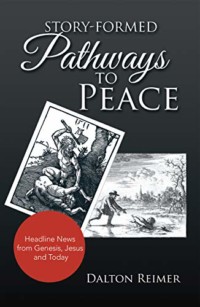Title: Story-Formed Pathways to Peace: Headline News from Genesis, Jesus and Today
Author: Dalton Reimar
Publisher: XlibrisUS
ISBN-13: 978-1-9845-5043-9
Pages: 188
Genre: Spiritual and Sociological
Reviewed by: Jason Lulos
Pacific Book Review
 Story-Formed Pathways to Peace: Headline News from Genesis, Jesus and Today is a phenomenal book. It is superbly written: a cogent yet complex journey through Biblical stories in their original context and in modern day application. If you’re looking for an insightful explication of Biblical themes and morals, look no further. Beginning with Genesis, Reimar illustrates the evolution of conflict resolution presented in the Old Testament. This trajectory (including noncooperation, conciliation, reconciliation, and forgiveness) culminates in the peaceful example set by Jesus. Rich in etymological clarification, narrative analysis, and practical application, this is a thoughtful and engaging work that strives toward achieving peace in all aspects of life.
Story-Formed Pathways to Peace: Headline News from Genesis, Jesus and Today is a phenomenal book. It is superbly written: a cogent yet complex journey through Biblical stories in their original context and in modern day application. If you’re looking for an insightful explication of Biblical themes and morals, look no further. Beginning with Genesis, Reimar illustrates the evolution of conflict resolution presented in the Old Testament. This trajectory (including noncooperation, conciliation, reconciliation, and forgiveness) culminates in the peaceful example set by Jesus. Rich in etymological clarification, narrative analysis, and practical application, this is a thoughtful and engaging work that strives toward achieving peace in all aspects of life.
Reimar begins each chapter with modern headlines framing ancient Biblical stories. The striking similarity clearly indicates that humanity has the same problems. The conclusion is simple: the lessons of the Bible are just as relevant today as they were 2,000-5,000 years ago.
“Scripts” are known as methods for conflict resolution in military and other arenas. We are given prescriptions for medical ailments. And scripts are literary works that literally tell the actors what to do and say. This book is about the lessons learned in the Bible. From these metaphors and logical deductions, God has given us scripts to follow: “story-formed pathways.” Sometimes they are literal, sometimes metaphoric. Reimar shines here by doing a close reading of certain Biblical passages. Certainly, there are ambiguities in the Bible, leaving room for interpretation. Where these occur, Reimar goes the extra etymological mile. Reimar put the work in and his interpretive conclusions are logical, text-based, and insightful. In terms of books on the Old Testament, (for me), this is comparative to Elie Wiesel’s Messengers of God.
Reimar traces the conflicts faced within families, neighbors, nations, enemies, and outsiders (or the “other”). He acknowledges the messages of Jesus would strike many as impractical in 2018, but he gives logical justification for reconsidering. Gandhi’s “noncooperation” is one modern historical example. Reimar also addresses the more common (and therefore overlooked) sentiments such as the meek inheriting the earth. In this case, Reimar gives some clarification that this actually means the meek have to “get up, go ahead, and do something.” I will say that at no time is there any political bent in the book. Also, although being focused on Christian doctrine, the author consistently cites textual and philosophical links to other religions: namely Judaism and Islam. Such political/religious boundaries are to be cast aside.
Reimar discusses the different strategies en route to peace: noncooperation, conciliation, reconciliation, forgiveness, and inclusiveness. He uses an effective boundary vs. centered thinking to show the consistency of doing and saying as Jesus said and did. From all of this, Old Testament to the New, readers get “scripts” or “story- formed pathways” which all point toward peace.



Follow Us